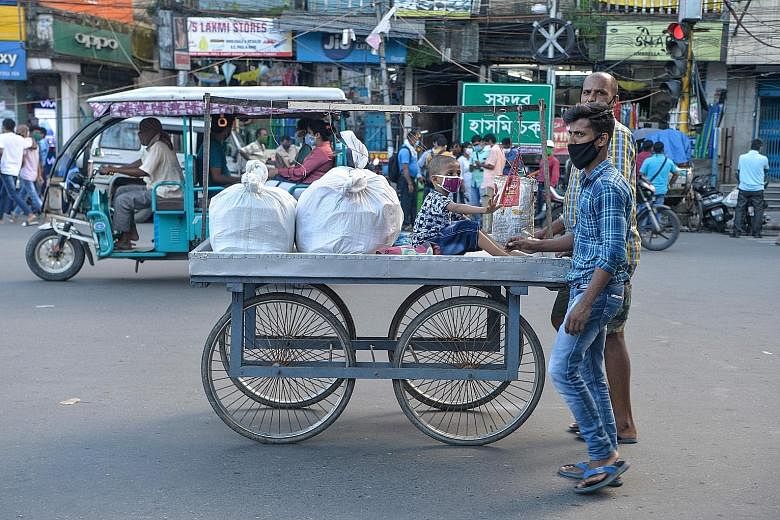BENGALURU/NEW DELHI • India reported a record daily jump of 69,652 coronavirus infections yesterday, taking the total case count in the country to 2.84 million, data from the Health Ministry showed.
As of last night, the number had pushed past 2.85 million and the death toll stood at over 54,000. India is the worst-hit country in Asia and third globally behind the US and Brazil in terms of case numbers.
India is also staring at a protracted slowdown as infections reach the countryside, with signs of recovery in the rural economy hailed by Prime Minister Narendra Modi being "at best a mitigating factor", said government officials and analysts.
The world's No. 5 economy will report first-quarter gross domestic product data on Aug 31. According to a Reuters poll, there was likely a 20 per cent contraction in the April to June period. The economy is also forecast to shrink 5.1 per cent in the year to March next year, the weakest performance since 1979.
Nearly half of India's 1.38 billion people rely on agriculture to survive, with the sector accounting for 15 per cent of economic output.
Mr Modi has been citing higher fertiliser demand and the sowing of monsoon crops, both key signs of rural activity, to show there are "green shoots" in the economy.
But four government officials said the uptick in activity may not be as large as believed given a spike in virus cases in rural areas that were initially isolated from the pandemic.
"The economic situation has in fact worsened since April and May, and we are likely moving towards a longer economic slowdown than expected," a Finance Ministry official said, pointing to sluggish consumer demand and a slowdown in rural lending as causes for concern.
A government adviser with knowledge of India's budget plans said: "The situation on the economy front is very serious and the government's hands are tied on the fiscal front."
Both declined to be named as they were not authorised to speak to the media. A ministry spokesman declined to comment.
Separately, Dr A. Velumani, head of leading private laboratory Thyrocare, said at least one in four people in India may have been infected - much higher than official government figures suggest.
An analysis of 270,000 antibody tests done by Thyrocare across India showed the presence of antibodies in an average of 26 per cent of the people, indicating they had already been exposed to the virus, he said.
"This is a much higher percentage than we had expected. The presence of antibodies is uniform across all age groups, including children," Dr Velumani told Reuters.
Thyrocare's findings are in line with government surveys done in Indian cities such as Mumbai, which showed that 57 per cent of the population in its crowded slum areas had been exposed to the virus. The Thyrocare survey covered paid and tested patients in 600 cities in India for the last seven weeks.
If the trend continues, the percentage of India's population having antibodies may hit 40 per cent before the end of December.
REUTERS












